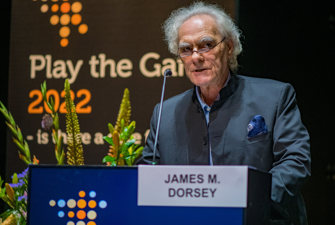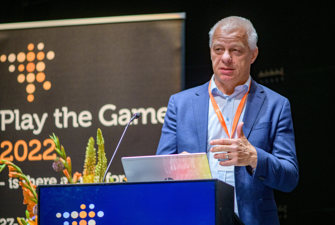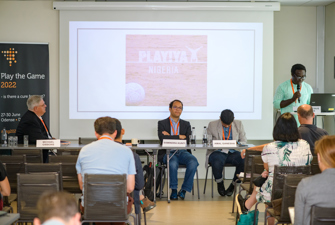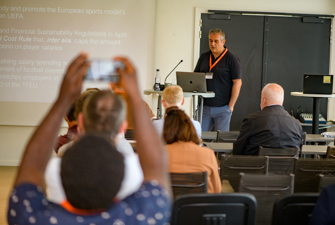Professor: Cut the amount of football in half for the sake of sustainability
According to Tim Walters, a Canadian college professor, sustainable sport requires fundamentally rethinking the way we do sport. He hopes that fans and players can put pressure on sports organisations to change the structure of sport but is less optimistic when it comes to government intervention in sport’s autonomy.
Under the headline 'Becoming good ancestors: Less football for an inhabitable earth', Canadian college professor Tim Walters participated in a debate on sustainable sport at Play the Game 2022 in Odense. Since the last Play the Game conference in Colorado Springs in 2019, climate change and what to do about it has become an increasingly important issue to many stakeholders in sport.
“In the past few years there has been an explosion in the amount of interest and activity, and a lot of it is positive. But it’s mostly focused on the game-day experience,” Tim Walters said in an interview after his presentation of major carbon footprints caused by global sport events.
“I think we need to be treating this as an emergency and that requires fundamentally rethinking the way we do sports. For me, that involves reducing the amount of sport. You can cut the amount of football in half any day and forever,” he said at a time when the number of sport events and competitions are higher than ever.
Do you see any signs of progress in that direction?
“I am cautiously optimistic. One of the reasons is that climate change is not only an existential threat to our species. It’s an existential threat for sports organisations as well. Sports are going to find it increasingly difficult to make a convincing ethical argument for why it should be ok for FIFA to encourage millions of people to get on aeroplanes and fly huge distances,” Walters said.
“I think these changes are coming. My hope is to work with fan groups, player groups, and NGOs to sort of encourage this idea that we need to be more radical about changing the structure of sports, since for me that is ultimately the problem. And it is also the hardest thing to change.”
“This idea seems crazy to people. But as a football fan, I have been thinking about how that would affect my life: Not very much. There would still be plenty of content for me to consume as a fan and still ways for people to profit from the game. So, this gives me cause for optimism as well,” Walters said.
Do you think sports leaders are able to make decisions as fast as needed?
“They change their cultures very slowly. But I think there is a lot of people within these sports organisations who care about this and there is a general rising interest in and concern with these questions in the public that bubbles up. But like everything else, you need to struggle to apply pressure. FIFA is not going to change the way that it does World Cups unless it has to and can live with what the alternative would look like,” Walters said.
“So, I am never optimistic about organisations like FIFA or UEFA coming to these decisions by themselves. But I think that they will do what they have to do to be a successful entity. My hope is that if we can make sustainable sport ‘the thing’ and enough people are advocating for it, that at some point it becomes impossible for the sports organisations to not do something.”
It will solve other problems as well
But Tim Walthers’ optimism is also caused by the fact that minimising sport’s carbon footprint by reducing the amount of sport played could solve other sports problems as well.
“You are hearing more and more about players' exertion. Fewer competitions are better for the players’ bodies. I see a reduction in the amount of sport being played as having other benefits too that perhaps can be attractive for other stakeholder groups within sport.”
Do you have the same optimism about government intervention in sport’s autonomy if the sports organisations don’t change the structure of sport?
“There I am a little bit less optimistic. I don’t know why we allow sports to operate with the level of autonomy that we do. It’s not a kind of consideration we give to any other business or industry. Somehow, sports can just do whatever they want. The only time I have ever seen a government engage in a restrictive way with FIFA was the US Justice Department’s engagement in the FIFA corruption case. So, no. I am not optimistic that pressure on sports organisations would come from governments, because governments are similarly reluctant to make any kind of changes to the way they function,” Walters said.
“Pressure will come from fans and players and organisations like Play the Game, and other NGOs around the world that are interested in leading the way that people are thinking about these problems.”











